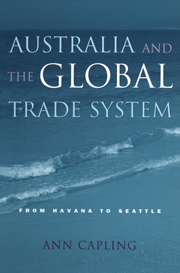Book contents
- Frontmatter
- Contents
- List of Tables and Figures
- Acknowledgments
- List of Abbreviations
- Introduction
- 1 ‘The Enfant Terrible’: Australia and the Reconstruction of the Multilateral Trade System
- 2 Coming to Terms with Multilateralism
- 3 Damage Control, Policy Stasis and Diplomatic Paralysis
- 4 Policy Innovation, Diplomatic Departures and the Uruguay Round
- 5 The Cairns Group
- 6 Aggressive Multilateralism: Negotiating Services
- 7 The American Way? Aggressive Bilateralism in Australian Trade Policy
- 8 The WTO System in Crisis
- Conclusion
- Appendix 1 Departments and Ministers responsible for GATT/WTO Negotiations
- Appendix 2 GATT Trade Runds
- Notes
- Index
4 - Policy Innovation, Diplomatic Departures and the Uruguay Round
Published online by Cambridge University Press: 07 October 2011
- Frontmatter
- Contents
- List of Tables and Figures
- Acknowledgments
- List of Abbreviations
- Introduction
- 1 ‘The Enfant Terrible’: Australia and the Reconstruction of the Multilateral Trade System
- 2 Coming to Terms with Multilateralism
- 3 Damage Control, Policy Stasis and Diplomatic Paralysis
- 4 Policy Innovation, Diplomatic Departures and the Uruguay Round
- 5 The Cairns Group
- 6 Aggressive Multilateralism: Negotiating Services
- 7 The American Way? Aggressive Bilateralism in Australian Trade Policy
- 8 The WTO System in Crisis
- Conclusion
- Appendix 1 Departments and Ministers responsible for GATT/WTO Negotiations
- Appendix 2 GATT Trade Runds
- Notes
- Index
Summary
The election of the Hawke Labor government in March 1983 made possible a fundamental reassessment of Australia's approach to multilateral trade policy and the GATT. Such a reappraisal was long overdue. The sustainability of domestic insulation and industry protection depended on the viability of Australia's rural and mineral commodity export sectors. However for most of the postwar era the prices received for these commodities fell relative to the prices paid for its manufactured imports. Despite high productivity growth in agriculture, Australia was still confronted with a steady deterioration in its terms of trade, a widening current account deficit, a chronic balance of payments problem, and a real decline of national income, culminating in the ‘banana republic’ crisis following the collapse of world commodity prices in 1985–86.
Although Richard Higgott's claim that, by the mid-1980s, Australia had more in common with many of the least developed countries than the newly industrialising countries greatly overstated the case, his more general point about the growing marginalisation of Australia in the world economy was certainly valid. For instance, Australia's failure to participate in the expanision of trade in high value-added manufactures, intellecutal property, services and capital had seen its share of postwar global trade decline from 2.5 to about 1 per cent of the total, while dropping out the list of top twenty-five trading nations (having been twelfth in 1978).
- Type
- Chapter
- Information
- Australia and the Global Trade SystemFrom Havana to Seattle, pp. 95 - 117Publisher: Cambridge University PressPrint publication year: 2001



